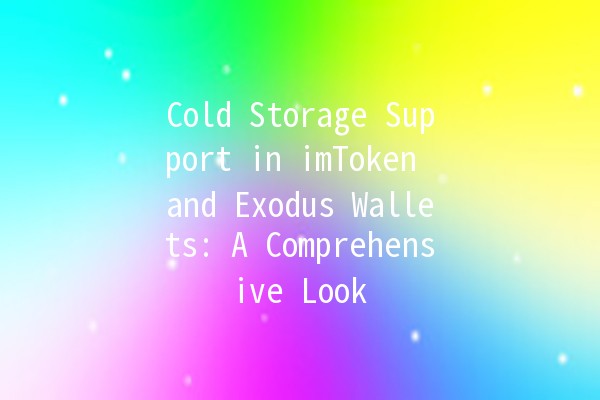When it comes to securing cryptocurrencies, cold storage plays a vital role in protecting digital assets from hacks and unauthorized access. Among the many wallets available, imToken and Exodus have gained significant popularity for their unique features and robust security mechanisms. This article delves into the cold storage support offered by both wallets, providing insights on how users can leverage these features to enhance their security.
Cold storage refers to keeping a cryptocurrency wallet offline, disconnected from the internet, making it highly resistant to hacking attempts. This method ensures that sensitive data and private keys remain secure, which is crucial for longterm storage.

imToken is a multichain wallet that supports various cryptocurrencies including Ethereum and its tokens. It has gained a reputation for its userfriendly interface and robust security features, making it suitable for both novice and experienced cryptocurrency holders.
imToken operates using a hierarchical deterministic wallet structure that allows users to generate a new address for every transaction, enhancing privacy. The wallet’s cold storage capabilities come from:
Private Key Management: Users retain full control over their private keys, which are stored securely within the device. This method of storing keys locally makes it near impossible for hackers to access them remotely.
Backup and Recovery: imToken offers a straightforward backup process, allowing users to generate mnemonic phrases for easy recovery. This feature is crucial for accessing assets in case of device loss or theft.
Exodus is known for its beautiful user interface and support for multiple cryptocurrencies. Unlike many wallets, Exodus is a software wallet that also offers integration with hardware wallets like Trezor, providing users with flexible options for managing their assets.
Exodus incorporates several features for cold storage, such as:
Integration with Hardware Wallets: By connecting to hardware wallets like Trezor, users can securely manage their digital assets while keeping their private keys offline.
User Control Over Private Keys: Similar to imToken, users have complete ownership of their private keys, ensuring that they are not vulnerable to online threats.
Wallet Backup: Exodus provides a simple backup mechanism through a recovery phrase, ensuring that users can regain access to their digital assets if needed.
When evaluating the cold storage support of imToken and Exodus, several factors come into play. Below is a comparison based on various criteria.
Both wallets allow users full control over their private keys, a significant advantage that enhances security. However, the way they manage these keys differs slightly. imToken stores keys directly on the device, while Exodus offers integration capabilities with dedicated hardware wallets like Trezor.
Both imToken and Exodus provide easy backup features through mnemonic phrases. While the processes are straightforward, imToken’s emphasis on devicelocal encryption can give some users a sense of additional security.
Exodus is particularly noted for its visually appealing interface and ease of use, which may attract users who prioritize design. In contrast, imToken emphasizes functionality and support for multiple chains, appealing more to users with advanced cryptocurrency knowledge.
Example: If your password is "Wallet123", change it to "W@ll3t#2023!".
Application: Turn on automatic updates if available, or periodically check for manual updates.
Example: Use an authenticator app for generating 2FA codes.
Example: Write down your recovery phrase and keep it in a fireproof safe.
Example: Use bookmarks to access your wallet rather than searching online.
Cold storage refers to the method of securely storing your cryptocurrencies offline. This technique reduces vulnerability to online attacks, making it a preferred choice for longterm holders. By keeping your private keys disconnected from the internet, you mitigate potential hacking risks.
Yes, both wallets offer recovery options through mnemonic phrases. When you set up your wallet, you'll be prompted to write down a recovery phrase of 1224 words. This phrase allows you to restore your wallet on any device should you lose your original device.
Generally, hardware wallets are considered the most secure option for storing cryptocurrencies because they keep your private keys completely offline. However, both imToken and Exodus offer excellent security features and can serve well for users who prioritize convenience or wish to manage multiple cryptocurrencies.
It is advisable to regularly check for software updates for your wallet. Set a reminder to check for updates at least once a month or enable automatic updates if the feature is available.
If you forget your password but have your recovery phrase, you can restore your wallet on a different device. However, without the recovery phrase, it could be challenging, if not impossible, to regain access to your assets. Make sure to store your recovery phrase securely.
Both wallets do not charge specific fees for the use of their cold storage features. However, transaction fees may apply when sending or receiving cryptocurrencies, which are typically paid to miners. Always review the fee structure on your wallet for the most accurate information.
When choosing between imToken and Exodus for cold storage support, understanding your specific needs and preferences is crucial. Both wallets present unique features that cater to various user requirements. By employing the right security measures and practices, you can effectively secure your cryptocurrencies and enjoy peace of mind. Whether you prefer the environment imToken provides or the interface and versatility of Exodus, both options offer robust solutions for cold storage, ensuring your cryptocurrencies remain safe and sound.